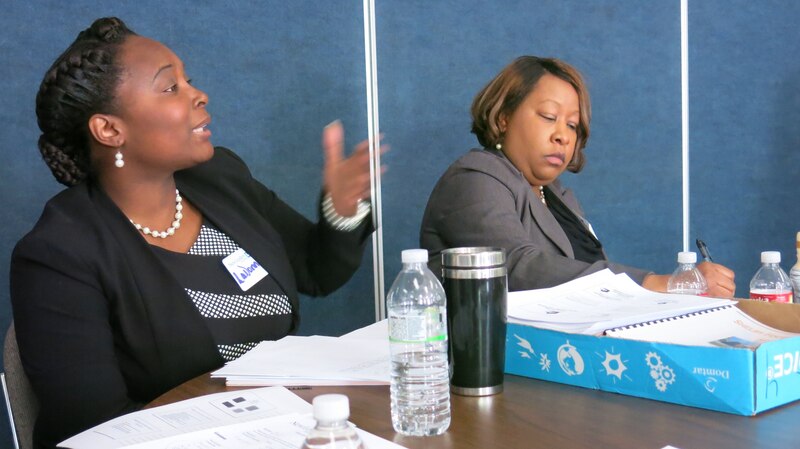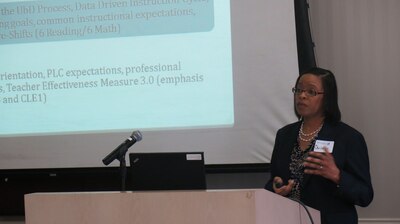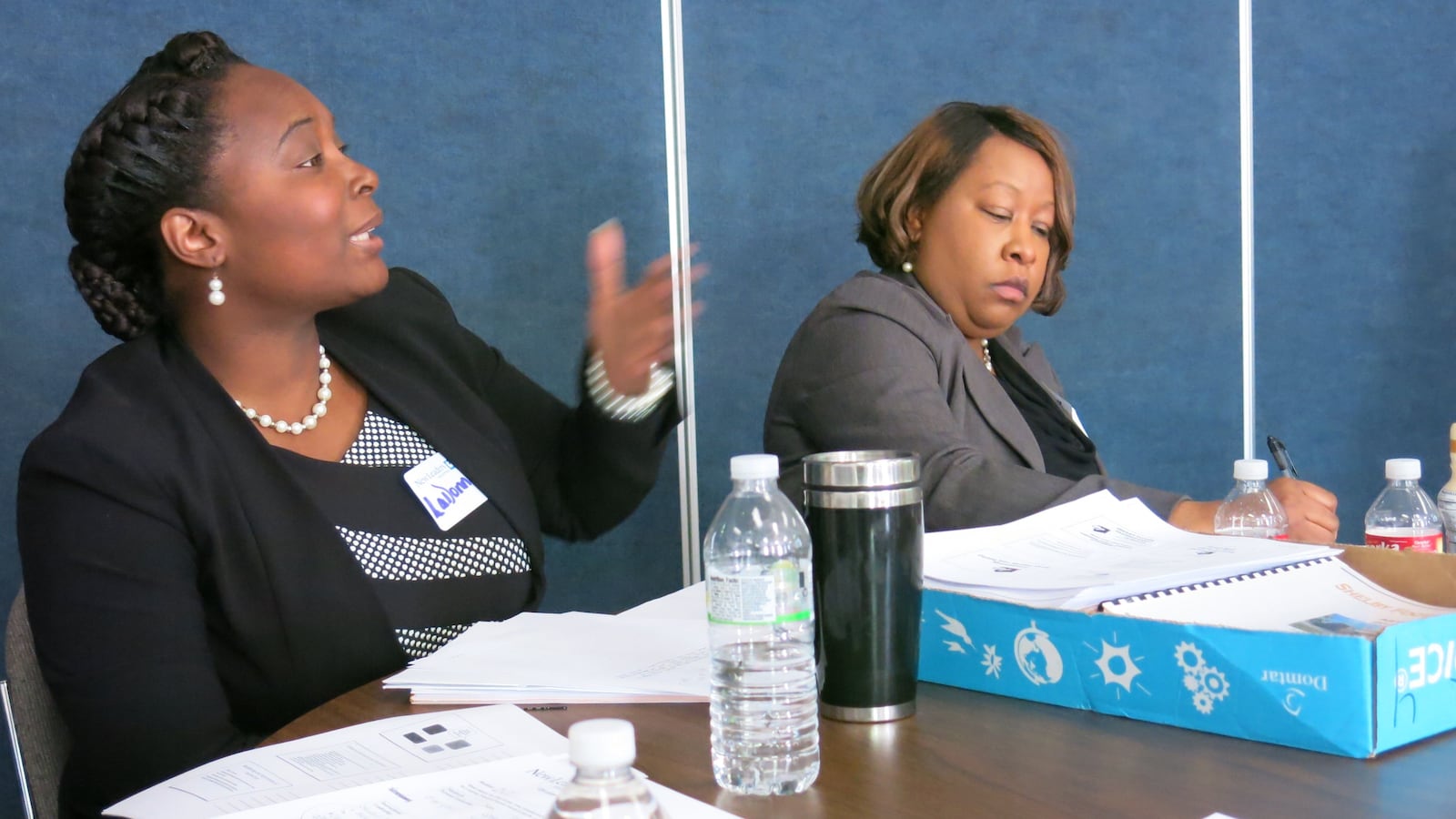As LaSandra M. Young described it, the challenges facing the fictional Isaac Hayes Middle School were stark: Declining enrollment, a 10 percent decrease in students ‘attendance, low teacher morale and frequent discipline issues.
But she was just as clear about her vision for the school: Twenty percent more students passing state tests, consistent classroom observations and professional learning communities for teachers, frequent contact with families and a culture based on the slogan, “Learning is not a period in life, but a way of life.”
“You’ll see students reading and writing,” she said. “You’ll see students engaging. At Isaac Hayes Middle School, we’re not going to let you fail.”
Young, currently an Assistant Principal at Treadwell Middle School, was giving her “Dream A School” presentation – the culmination of her participation in New Leaders’ Aspiring Principals Program. Participants are placed as assistant principals in Shelby County Schools, which includes the city of Memphis, and take a series of classes in school leadership and receive regular coaching and feedback from school leaders. At the end of the year, most interview with the school district in hopes of becoming principals.

Last Thursday, Young and six other aspiring principals shared their “dreams.” They had been presented with a detailed description of an imaginary school in Memphis (such as Isaac Hayes), designed to exemplify the conditions of the high-needs schools where the principals are training to work.
Each of the seven presented as though they were the school’s principal, describing who they are (“A mother, a granddaughter, a mentee of…”) and why they were drawn to the work (“Each student could be a Kendra…”), as well as their plans for the school.
Memphis is home to the majority of Tennessee’s lowest-performing schools. Just 67 percent of students in Memphis last year graduated high school, and 5 percent passed all sections of their ACT. Most of the district’s students live in poverty, and many attend schools that are racially homogenous and have reputations for being unsafe. A series of school closings and state takeovers aimed at improving the situation have added to the uncertainty and turmoil for thousands of Memphis students and teachers.
New Leaders, which has been in Memphis since 2004, aims to prepare school leaders to work in and improve those struggling schools. Thirty-three principals in Shelby County Schools and about 90 district leaders have gone through the program in some capacity, said Camelia Scott, the manager of recruitment and operations for New Leaders in Memphis. (Its cohort was smaller than usual this year due to uncertainty resulting from plans to carve six new suburban school systems out of Shelby County Schools.)
New Leaders also has an emerging leaders program for teachers and a program that coaches principals in their first years on the job.
Tim Ware, the executive director of New Leaders in Memphis, said eight of the 22 Memphis Reward Schools, or schools singled out by the state for their students’ improvement on state tests, were led by New Leaders principals. “This project helps them think through their visions and what are leadership moves that help students live lives of destiny and purpose,” he said.
The Memphis New Leaders program is part of a national organization, which released a set of policy recommendations earlier this week in a report called “Prioritizing Leadership.” It recommends that states promote recognition and rewards for successful school leaders in order to improve retention, and that they support “innovative approaches to principal preparation” that include a clinical component like the Aspiring Principals Program.
The policy report says that the role of the principal has grown increasingly complex in recent years: School leaders are now “instructional leaders, talent managers, and culture builders.”
That evolving role was clear as residents described how they would lead their schools. Their presentations included everything from establishing relationships with parents, using data to help students improve their academics, and plans to help struggling teachers improve.
Tamika Carwell, the managing director at New Leaders in Memphis, said the “Dream A School” presentations allow the residents to connect their experiences as resident administrators with their learning through the New Leaders program. The audience, which included the other residents, New Leaders alumni and principal mentors, critiqued each presentation.
After commending her improvement since winter, Carwell told Young, “Your teachers or your students may not come to you ready to do the work the way you’re ready to do the work. What will you do then? How will you build your culture?”
Resident Pondora Washington said that the presentations had evolved since December. “At first, I was nervous,” she said. “I didn’t put a lot of myself into it. But we got feedback that helped us improve.”
She said she appreciated the presentation’s focus on using historical information about a school to help plan, and that her current experience as an assistant principal shaped her vision for her school.

One presenter’s “Dream A School” was no longer a dream: Christine Vandiver-Tate will be principal at Grandview Middle School next year, and presented information about how she plans to improve her school, which is undergoing a major transition. Grandview will be receiving students from Cypress Middle School, which is being taken over grade-by-grade by a KIPP school as part of the state-run Achievement School District, and will simultaneously become part of the district’s Innovation Zone, in which school leaders receive some flexibility and extra funds and are tasked with dramatically improving test scores.
Vandiver-Tate described her plans to restaff the school and help merge the two schools’ cultures. The other participants wanted more detail about what happened when her plans met sometimes-challenging realities.
“It would be great if you could use this as a chance to share your experience, like when you said you changed your teaching hiring process,” Carwell said. “For you, your dream school is no longer a dream school. It’s your real school.”


